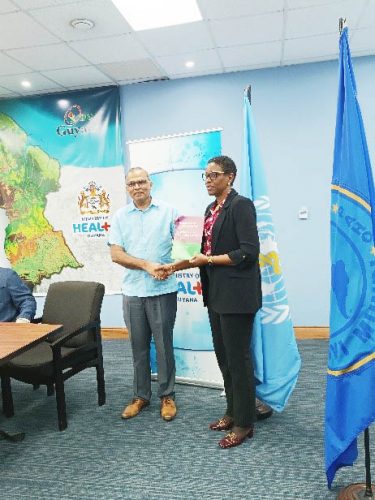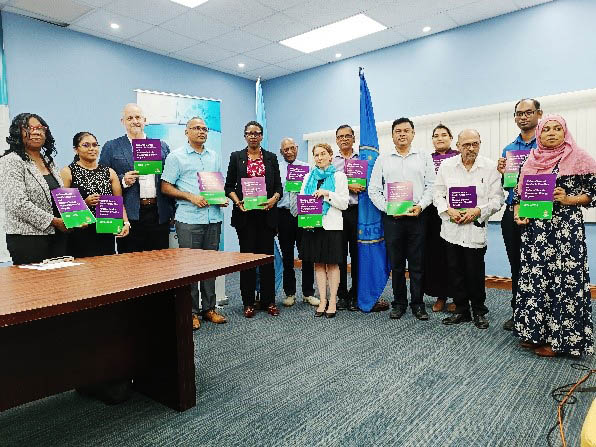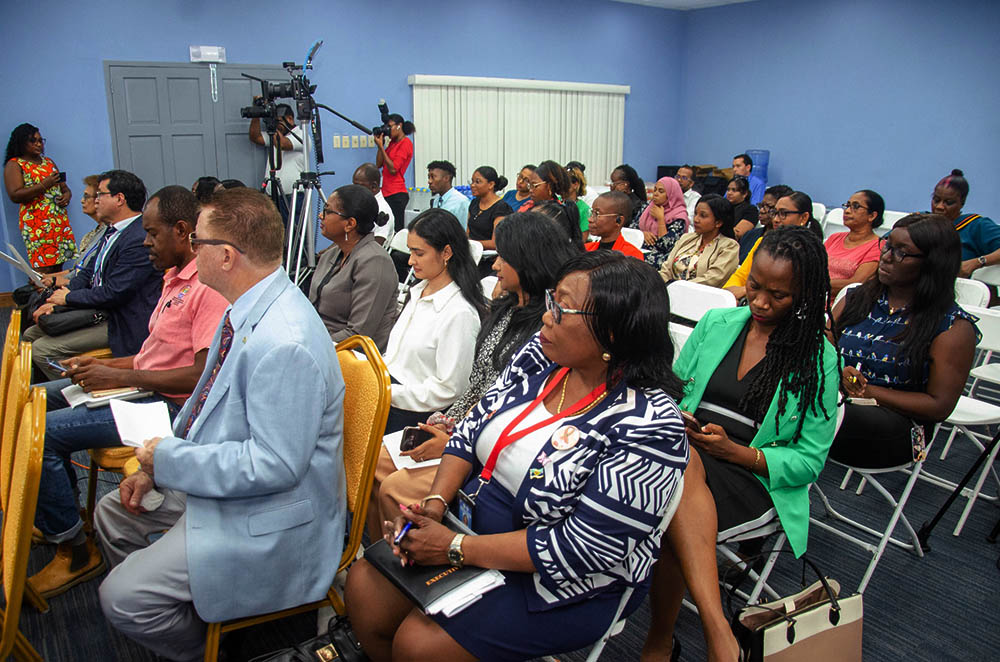By Abigail Headley
In an effort to decentralize mental healthcare services and to better target suicide and its triggers in Guyana, the Ministry of Health has launched the National Mental Health Action Plan and the National Suicide Prevention Plan for the years 2024-2030. The launch, which took place yesterday, was collaborated by the Pan American Health Organisation (PAHO)/World Health Organisation (WHO).
Delivering the feature address, Minister of Health Dr Frank Anthony disclosed that efforts were being made by the ministry to decentralise mental health care services in the country, making them more accessible in various regions.
“A lot of mental health care was centralised at the George-town Public Hospital. And so, one of the steps that we have taken is to take this out to other regional hospitals,” he said. “So now people can access mental health services in Regions Three and Two because we have decentralised. Of course, we have had mental health services being offered in Region Six, because that’s home of the National Psychiatric Hospital and they also go across to Region Five. In Region Four, apart from what we do at the Georgetown Public Hospital, we’ve been sending out people… to different parts of Region Four. We have also been sending people out to Region 10. For the areas like Regions One, Seven, Eight and Nine, because we have a telemedicine infrastructure, we can offer tele-psychology/psychiatry…”

He added that currently there are 25 sites in Regions One, Seven, Eight, Nine, and Ten, “where we have this telemedicine infrastructure and within another month or so, we will add another 25 sites”.
Anthony noted the importance of updating outdated legislation surrounding mental health care and suicide prevention, citing the passage of the Mental Health Promotion and Protection Bill and the Suicide Prevention Act as significant milestones.
“One of the first things that we did was to look at the legislation that governs mental health in Guyana… And we were then able to update that legislation, building on the work that was done, started by Dr Ramsammy in 2010… We were finally able to pass the Mental Health Promotion and Protection Bill and now it’s a law… We have modernised in many respects what we do for mental health, and we have a human rights approach to mental health, which is unlike how past legislation was being written, because if you compare the terms used in the last old legislation, to what we have now, the old legislation talks about “imbecile” and it has things like “asylum” and all kinds of terms that today are not appropriate,” he said.
The minister explained that over the years, there has been significant progress in how mental health patients are treated, leading to the need for updated legislation to reflect these improvements.

Anthony noted that the Suicide Prevention Act has paved the way for the establishment of a Suicide Prevention Commission. This multi-sectoral group is working on various aspects of suicide prevention and is focused on translating legislative measures into practical outcomes. He expressed gratitude for the support from PAHO, highlighting the technical expertise that was provided.
PAHO/WHO representative in Guyana Dr Luis Codina and Assistant Director at PAHO/WHO Dr Rhonda Sealey-Thomas also made remarks.
Dr Codina emphasised the need for reform in the mental health sector, moving away from traditional psychiatric responses to a more integrated and community-based approach. He commended Guyana’s progress in addressing mental health challenges and noted the importance of stakeholder involvement in the implementation of the national action plan and suicide prevention plan.
Meanwhile, Dr Sealey-Thomas praised the government’s commitment to improving mental health services and reducing stigma surrounding mental health conditions and suicide. She highlighted the importance of multisectoral collaboration and technical support from PAHO and WHO in achieving the goals outlined in the action plans.
The national action plan and suicide prevention plan booklet provides valuable information on the current state of mental health services in Guyana, including the number of psychiatrists and clinical psychologists in the country. According to the booklet, Guyana currently has 18 psychiatrists, including two child psychiatrists and one forensic psychiatrist. Additionally, there are five clinical psychologists. Last year, as part of the collaboration between the Cuban medical brigade and the Ministry of Health, a number of Cuban medical professionals were placed at the National Psychiatric Hospital for a three-year period, including one child and adolescent psychiatrist, four psychiatrists, two clinical psychologists, and two occupational therapists.
The booklet also highlights legislative changes related to suicide prevention, such as the decriminalising of suicidal behaviour in 2022.
“The criminalisation of suicide and attempted suicide can deter individuals seeking mental health support. While suicide and attempted suicide are no longer punishable by low, the stigma attached to suicidal behaviour persists. It may take longer for this stigma to decrease and for individuals to seek mental health support. Nevertheless, the Suicide Prevention Act established key foundations needed to accelerate suicide prevention efforts in Guyana,” the booklet explains.
The launch was attended by several key officials and stakeholders, including former health ministers Bheri Ramsarran and Leslie Ramsammy, senior ministry officials, and doctors.









